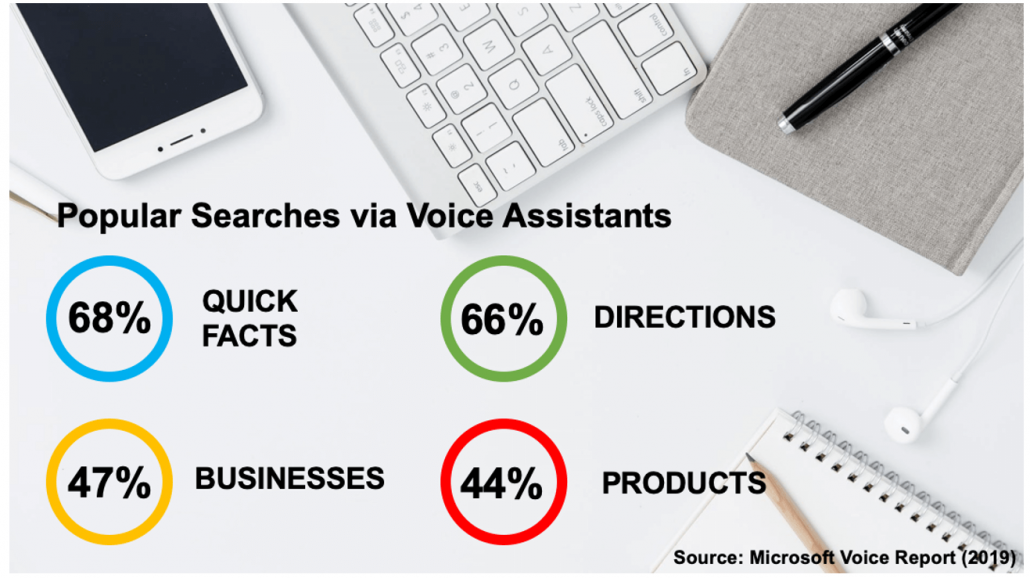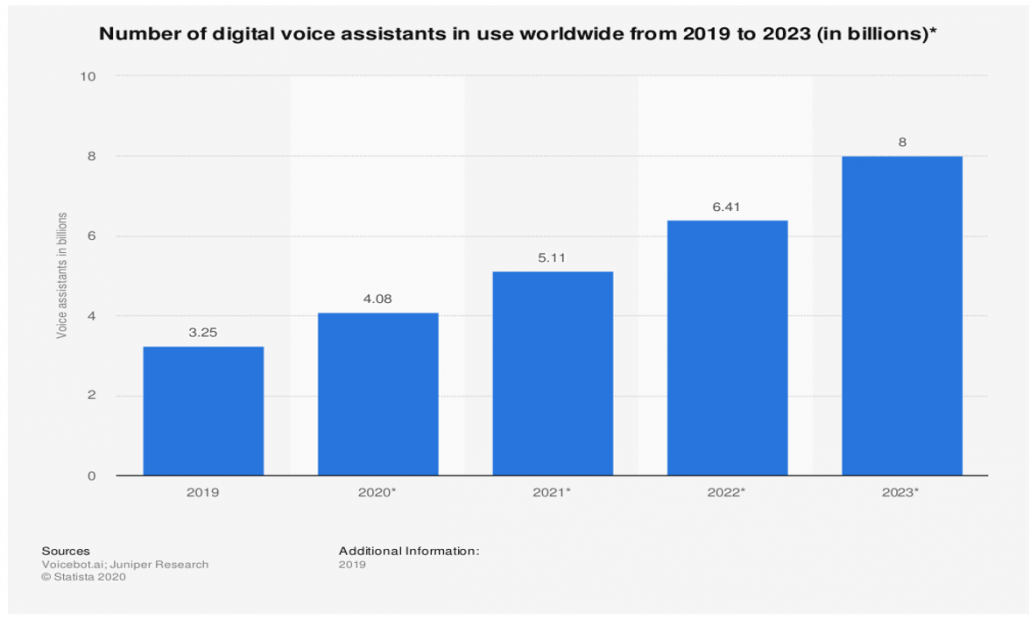Voice marketing: How to optimise Google voice search for your brand

“Hey Google, where’s the nearest supermarket?”
“Hey Google, what’s a Birkin?”
Searches like these are becoming increasingly popular with Google’s integration of Artificial Intelligence (AI), and voice recognition software. Google’s introduction of new voice activated devices such as the Google Home and Google Nest are just the beginning of a revolutionary change that has the potential to cause a stir in the marketing industry.
Competing with other tech-giants such as Apple’s Siri, and Amazon’s Echo, Google is able to set itself apart with its seamless integration with its other platforms such as Google Maps, and Google Search.
With the adoption rate for voice assistance increasing in households around the world, it is a window of opportunity that your business can utilise to improve your brand awareness and customer accessibility. If your content is optimised for voice searches, your Search Engine Optimisation (SEO) ranking will skyrocket because of the competitive advantage you will receive over non-adopters.
As of 2019, 72 percent of smartphone users are using voice assistants, with Google and Siri attaining a 36 percent market share each. Some of the popular searches via voice assistants range from quick facts, to directions, businesses, and products. If your brand or business fits into one of these search categories, you are likely better off having it optimised for better performance.

So what does this mean for your brand’s ability to gain search traffic? With the rise in new ways of searching for information, how can you improve your website while remaining ahead of the competition?
Let’s dive deeper in understanding what Voice Marketing is, and learn of some simple ways to make effective use of Google’s voice search to optimise your own website.
What is Voice Marketing, and why does it matter?
Voice marketing is defined as the use of voice-enabled devices, AI, and marketing strategies to reach out to target audiences and improve brand awareness. Some examples of voice enabled devices include smartphones, smart-television, radios, and smart-speakers.
Strategies such as SEO, focuses on increasing the visibility of organic search results on search engines such as Google, and it is absolutely free! Of course, you could also utilise Search Engine Marketing (SEM) or pay-per-click (PPC) advertising in conjunction with SEO to further increase your website’s prominence on the web.
Now, you might wonder, what is the difference between regular Search Marketing and Voice Marketing then? Well, the answer is, not much. However, there are areas in which Google places special attention to, when generating results for users who search via voice. This is because, the way in which we conduct searches via voice and text is different. For example, with voice, questions are more regularly to be asked in full as compared to text which manly comprises of keywords.
In addition, voice searches are served with search results rather than traditional clickable links. Allowing your brand to interact with voice queries rather than purely search results will help increase voice search utilisation and ultimately, brand awareness.
Research has shown that when consumers are able to get an adequate answer from a voice assistant, they would turn it into an online search, which would then increase the chances of a customer clicking on a website and move along the customer’s buying process.
With the accelerating number of voice-enabled devices being adopted, it is important for your brand to incorporate voice into your marketing strategy in order to remain competitive. Furthermore, adapting your strategy to integrate voice searches will help increase traffic to your website and ultimately improve your SEO ranking, and sales.

Google My Business
It is highly recommended that you sign up for a Google My Business as this powerful tool allows you to connect with customers across the Google Search and Maps platforms.
Having a Google My Business account will enable you to be featured on location based “near me” searches which will greatly improve the chances of your business being announced on Google for navigational based searches.
Including your business name, address, and phone number, and category is a vital step as they provide Google with crucial information to be passed on to the user. It is also highly advised to include business operating hours, and responding actively to reviews.
Most often, voice searches tend to lead to traditional searches as users seek out more detailed information such as price and customer reviews. Hence, it is also important to include more than what is minimally required by Google as it provides you with a higher ranking, and aids your brand in pushing through the customer buying criteria.
Setting up a Google My Business can be completed in 4 easy steps:
- Head over to the Google My Business page and click on the blue “Manage now” button on the top right corner of the page.
- Enter your:
- business name
- category (do add related categories but be careful of category confusion)
- location (optional, but recommended),
- phone number,
- website (Google creates a free site for you if you do not have one).
- Beef up your profile with crucial information mentioned above, including keywords, while keeping it relevant to your business. Information should be concise, clear, and straight to the point.
- Review your account and get it verified via an email link sent to your Google Account used to register.
Now you’re all set, and ready to be a step ahead of the competition!

Loading Time and Mobile Friendliness
Interestingly, yes, the loading time of your website does matter! Why is that so? Well, one of Google’s search criteria when delivering results is how fast your website loads, and how fast it is able to retrieve information from it.
Google emphasises that mobile searches are subjected to speed ranking which also includes other voice-enabled devices.
Consider the following platforms to measure the loading speed of your website:
On top of optimising your website’ speed, it is also important to have a mobile-friendly website that allows for information to be displayed cleanly and clearly. Mobile friendly websites gain You can test the friendliness of your website through Google here.
Here’s are some ways you can make your website more mobile friendly:
- Make your website more responsive
- Ensure that your pages are adjusted to fit different resolutions on mobile devices
- Create a more accessible website
- Make a more informed change with the use of Google Analytics to help you identify what customers are looking for in your website and make that portion stand out.
- Get rid of pop-ups and advertisements that block your texts
- Bear in mind that how you see content on your website is not displayed the same on mobile devices! No one likes to visit a page that is cluttered and not user-friendly.

Focus on Conversational Language and Keywords
Short-tail keywords are more often used in traditional searches by typing them out in the search bar. The difference with long-tail keywords, is that they have the ability to be structured in a conversational format which is what Google looks for and aims to deliver to their voice search users.
Websites that leverages on conversational language have a higher chance of being picked up and featured by Google in their results for query made via a voice search.
Below are five questions that you may wish to consider asking yourself when optimising your website for Voice Search:
- What type of questions are being asked?
- What kind of answers are most appropriate?
- How will these questions be phrased, worded, or structured?
- What are some of the keywords being used?
- What are the current results Google is delivering for similar questions?
Remember, voice searches are not the same as traditional searches. Questions are worded, and asked differently, and they tend to be much longer, containing more keywords. Some websites that may help you identify trending keywords and questions specific to your brand include BuzzSumo, MozPro, AnswerThePublic, and Google AdWords.

Bonus Tip!
You may also want to include a Frequently Asked Questions (FAQ) page on your website. This powerful tool will be extremely helpful not only for traditional searches but voice searches as well! FAQ pages contain numerous keywords and tying to point number 3 above, questions and answers are conversational which really boosts the likelihood of getting your answers featured on Google.

That’s a wrap!
By now, you should be aware that voice searches are becoming increasingly popular and is expected to continue to grow in the next few years. By being an early adopter of this trend, you will be able to take advantage and understand consumers at a much earlier stage than the rest of your competitors, giving you a head-start and time to accumulate valuable experience. So, if you’re not already jumping on it, I highly recommend you to do s0!
Key Takeaways
Demand for Digital voice assistants are growing fast and coupled with new features and capabilities, we can really see even more potential for the near future. Take Domino’s voice activated Pizza ordering application for example, who would have actually imagined that ordering with through your voice would have been possible without having to speak to someone on the other line.
By making use of Google MyBusiness, shortening your website loading time, making your website mobile friendly, and using conversational language and words, you would have taken a big and positive step towards optimising Google Voice Searches for your brand.Do you have any other ideas? Share them with us! We would love to hear from you!


Linus Tan
Final year commerce student at the University of Melbourne. Passionate about the benefits of technology in our lives. Also a sports enthusiast with a dream to travel the world.







